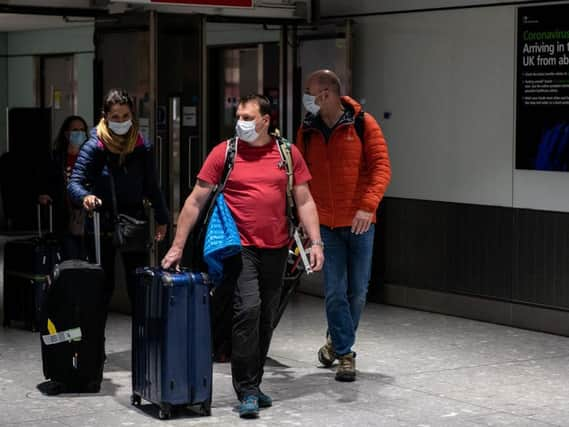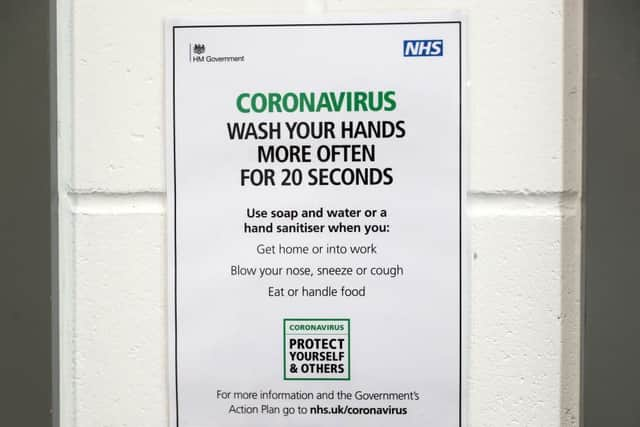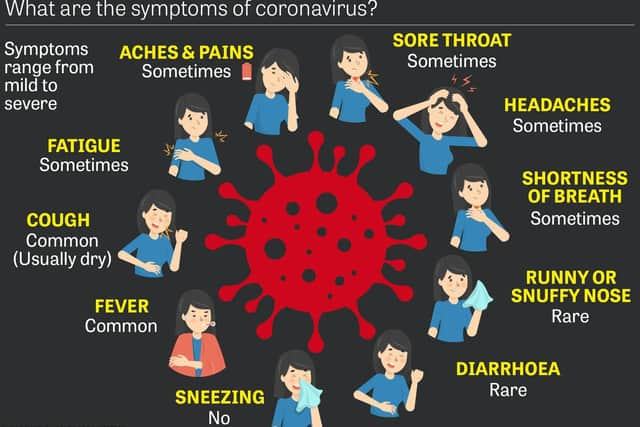Who is most at risk for coronavirus? From diabetes to asthma - the underlying conditions that make you more vulnerable to Covid-19


High risk means you're more likely to catch coronavirus or more likely to suffer a severe infection if you contract it.
This is everything you need to know about the conditions that make you high risk, plus all the latest advice on how to shield yourself from getting infected.
Advertisement
Hide AdAdvertisement
Hide AdWhat conditions make people more likely to catch coronavirus?


As coronavirus is a new virus, nobody has built up immunity to it - meaning anyone can become infected, regardless of age, gender or any other factors.
However, evidence suggests that those with weakened immune systems, as with any virus, are more susceptible to becoming infected by coronavirus.
This includes those undergoing cancer treatment, people being treated for autoimmune diseases like lupus, Multiple Sclerosis or inflammatory bowel diseases, those with HIV and those having an organ or bone-marrow transplant.
What conditions put people at the highest risk of severe infection?


A report from the World Heath Organisation, which studied cases in China, said that the underlying conditions which put people at the highest risk of severe disease are:
Hypertension (high blood pressure),
Cardiovascular disease,
Chronic respiratory disease (such as lung disease or asthma)
While patients without comorbid conditions (a medical condition co-occurring with coronavirus) had a crude fatality rate of 1.4 per cent, patients with cardiovascular disease had a fatality rate of 13.2 per cent.
Advertisement
Hide AdAdvertisement
Hide AdFor diabetes this was 9.2 per cent, 8.4 per cent for hypertension, 8.0 per cent for chronic respiratory disease and 7.6 per cent for cancer.
What other factors make severe infection more likely?
Aside from underlying medical conditions, age is one of the biggest risk factors when it comes to severity of infection, with the highest coronavirus mortality rates being seen among patients over the age of 80.
It has also been suggested that those who smoke or vape may be more susceptible to catching coronavirus and more likely to contract a severe infection.
Those with eating disorders or any other condition which causes them to lose a large amount of weight may also be more susceptible to coronavirus, given the condition can cause low-white blood cell counts which weakens the immune system.
What precautions should I take if I am high risk?
Those at high risk of contracting coronavirus and/or contracting a more severe form of the disease should follow precautions to lower their risk of catching it.
The most high-risk groups are advised to stay indoors as much as possible, avoiding contact with anyone outside the household. This includes getting shopping delivered where possible.
In addition to this, you should practice washing your hands regularly and thoroughly, avoiding touching your eyes, nose and mouth and avoiding contact with anyone who is unwell. To protect others from becoming unwell, you should also stay at home if you start to feel ill and cover coughs or sneezes with a tissue, and then throw the tissue in the bin.
Coronavirus: The Facts
COVID-19 is a respiratory illness that can affect lungs and airways. It is caused by a virus called coronavirus and is spread primarily through droplets generated when an infected person coughs or sneezes, or through droplets of saliva or discharge from the nose.
What are the symptoms?
Advertisement
Hide AdAdvertisement
Hide AdThe NHS states that you should not leave the home if you have either:
• a high temperature – this means you feel hot to touch on your chest or back (you do not need to measure your temperature)
• a new, continuous cough – this means coughing a lot for more than an hour, or 3 or more coughing episodes in 24 hours (if you usually have a cough, it may be worse than usual)
What should I do if I feel unwell?
Don’t go to your GP but instead look online at the coronavirus service that can tell you if you need medical help and what to do next. Only call 111 if you cannot get help online.
What precautions can be taken?
Washing your hands with soap and water thoroughly. The NHS also advises to cover your mouth and nose with a tissue or your sleeve (not your hands) when you cough or sneeze; put used tissues in the bin immediately and try to avoid close contact with people who are unwell. Also avoiding touching eyes, nose and mouth unless your hands are clean.
When can I go outside?
The Government has put the UK into lockdown and instructed everyone to stay at home. You should only leave your home for very limited purposes:
• shopping for basic necessities, for example food and medicine, which must be as infrequent as possible
• one form of exercise a day, for example a run, walk, or cycle – alone or with members of your household
Advertisement
Hide AdAdvertisement
Hide Ad• any medical need, including to donate blood, avoid or escape risk of injury or harm, or to provide care or to help a vulnerable person
• travelling for work purposes, but only where you cannot work from home
However, these reasons are exceptions – even when doing these activities, you should be minimising time spent outside of the home and ensuring you are 2 metres apart from anyone outside of your household.
Comments
Want to join the conversation? Please or to comment on this article.